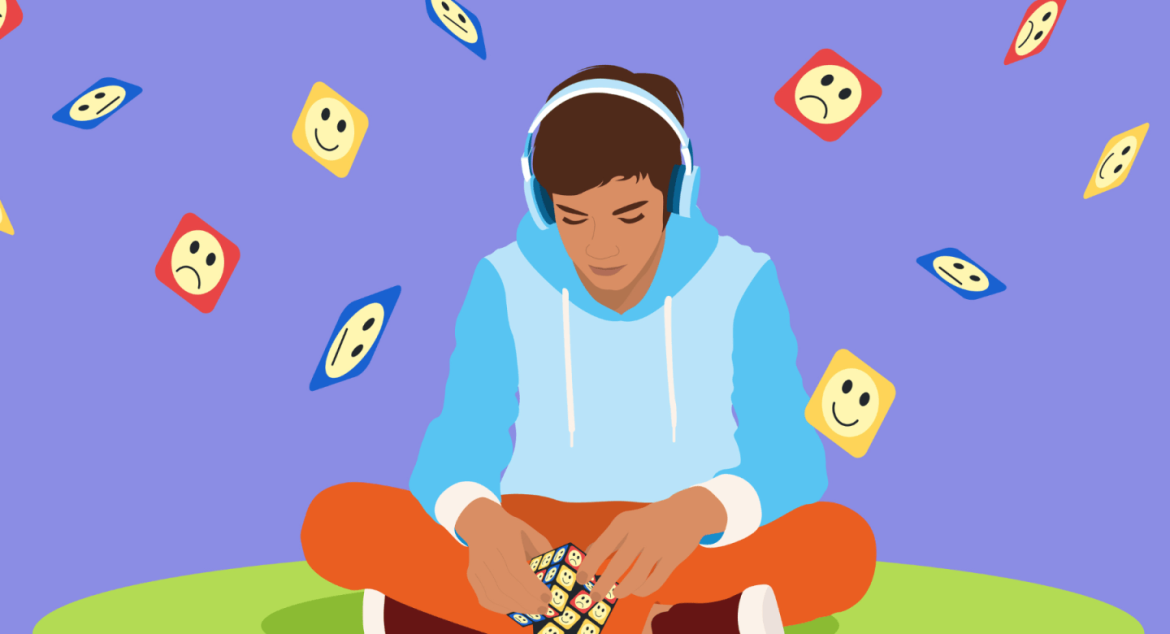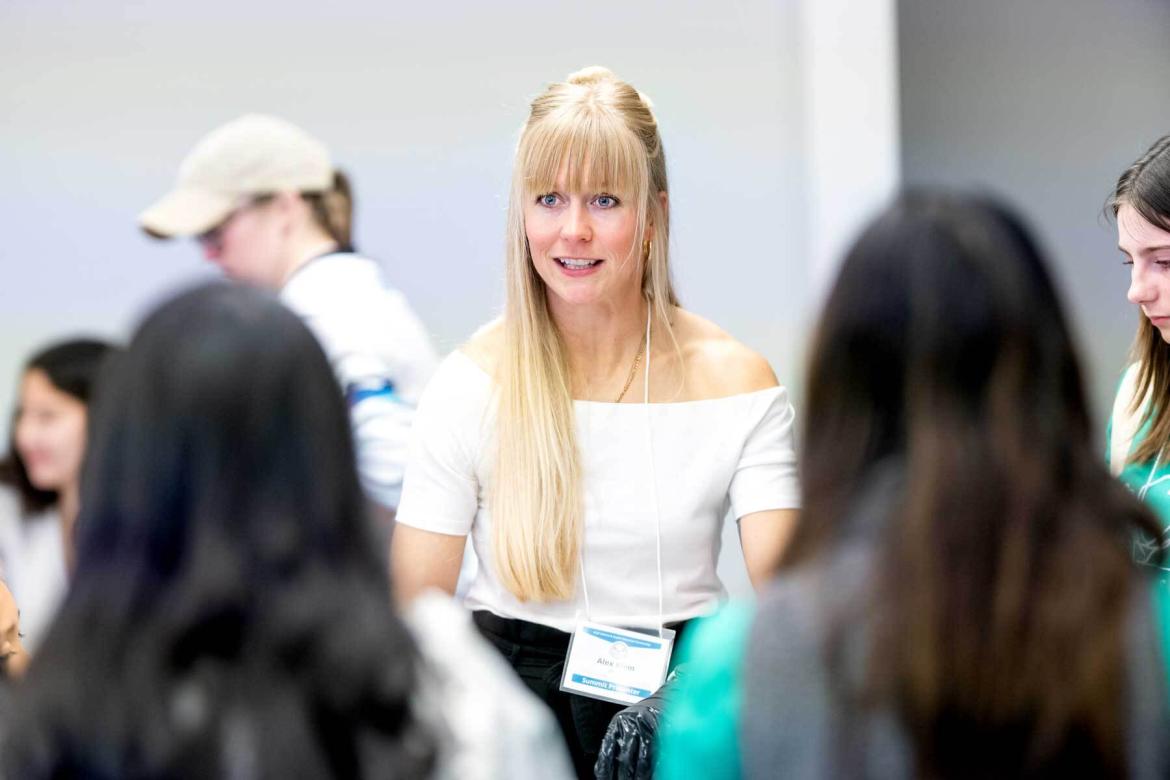By Eric Brooks

Science and mental health meet in a UC San Francisco program where clinicians and researchers learn just as much from high school students as they learn from them.
Teen Wellness Connection (TWC), which annually culminates in the Teen Wellness Summit on Mental Health, is made up of a collaborative community of 25 students from across San Francisco. Teen leaders learn about a range of mental health topics from UCSF and community health professionals in an engaging program designed to foster students’ sense of belonging in science and support students in becoming public health leaders among their peers.
That face time with UCSF clinicians and researchers pays dividends both ways.
“I think it’s very rewarding also for me as a researcher,” said Alexandra Klein, PhD, a UCSF postdoctoral scholar studying systems neuroscience. “It’s very helpful to interact with young people because if I hopefully manage to lead my own research group, I will work with undergraduates and graduate students who are in a very different stage of their career. It’s definitely beneficial for me to train with these students.”
Klein, who called the Teen Wellness Connection experience “super rewarding,” uses mice in her research to explore how emotions are processed in the brain. She won the 2024 Postdoc Slam presenting her research on how breathing impacts anxiety levels.
“This new generation is so much more open to actually learning about mental health problems and that this is a disease, that is, let’s say, as normal as breaking your leg. You can break your brain.”

UCSF postdoctoral scholar Alexandra Klein, PhD, leads a session on brain sciences at the Teen Wellness Summit on Mental Health at UCSF's Mission Bay campus. Photo by Noah Berger
Klein first joined the program as a presenter in the 2023.
Each cycle starts with a three-week summer intensive featuring presentations, panels and discussions on 12-15 relevant mental health topics such as depression and anxiety, stress, eating disorders, sleep, nutrition, substance use and emotions.
Community-building activities such as daily icebreakers and weekly field trips are also part of the experience.
Afterwards, students meet regularly throughout the subsequent months to plan a summit on mental health for their peers that takes place in February where more than 170 high school students attend workshops led by over 20 presenters and learn about opportunities to engage in their community. There’s also an art competition, dance performances and a collective art installation in which attendees participate.

UCSF postdoctoral scholar Sara Chung, PhD, answers questions from high school students related to her session on depression and anxiety at the Teen Wellness Summit on Mental Health at UCSF's Mission Bay campus. Photo by Noah Berger
Sara Chung, PhD, and Allie Giovanelli, PhD, have both been with the program since its inception three years ago.
“Obviously, mental health is a major issue for them,” said Chung, an assistant professor in the UCSF School of Medicine’s Department of Psychiatry and Behavioral Sciences. “It also dispels the notion that we, as providers, are inaccessible and in an ivory tower behind a wall.”
Chung herself struggled with mental health issues growing up, and watched her family do the same – making the subject matter personally and professionally significant.
She’s worked with students on depression and anxiety.
“It’s just so important to me to be able to reach out to teens who may be experiencing very similar issues and talk about similarities, but also learn about how things, communication and knowledge has been changing since I was a teen,” she added.
Giovanelli, whose background is in clinical psychology and developmental science, has talked to participating students about social media’s impact on teenagers and substance abuse disorders.
“This is an opportunity to exercise your creativity in terms of how you present the information that you're an expert on and think about how teens really want to engage,” said Giovanelli, an assistant professor of pediatrics in the School of Medicine’s Division of Adolescent and Young Adult Medicine.
The program is led by the UCSF Science and Health Education Partnership (SEP) and funded by a Science Education Partnership Award from the National Institutes of Health (NIH). The program learned in recent weeks that its NIH funding has been canceled, leaving the future of Teen Wellness Connection beyond the next academic year in question.
“SEP is hoping to find an alternative funding source to continue the work of bringing high school students and UCSF practitioners together to fight the stigma around mental health and empower our next generation of health professionals,” said Sabine Jeske, SEP academic coordinator.
About UCSF Psychiatry and Behavioral Sciences
The UCSF Department of Psychiatry and Behavioral Sciences and the Langley Porter Psychiatric Institute are among the nation's foremost resources in the fields of child, adolescent, adult, and geriatric mental health. Together they constitute one of the largest departments in the UCSF School of Medicine and the UCSF Weill Institute for Neurosciences, with a focus on providing unparalleled patient care, conducting impactful research, training the next generation of behavioral health leaders, and advancing diversity, health equity, and community across the field.
UCSF Psychiatry and Behavioral Sciences conducts its clinical, educational, and research efforts at a variety of locations in Northern California, including the UCSF Nancy Friend Pritzker Psychiatry Building; UCSF Langley Porter Psychiatric Hospital; UCSF Health medical centers and community hospitals across San Francisco; UCSF Benioff Children’s Hospitals in San Francisco and Oakland; Zuckerberg San Francisco General Hospital and Trauma Center; the San Francisco VA Health Care System; UCSF Fresno; and numerous community-based sites around the San Francisco Bay Area.
About the UCSF Weill Institute for Neurosciences
The UCSF Weill Institute for Neurosciences, established by the extraordinary generosity of Joan and Sanford I. "Sandy" Weill, brings together world-class researchers with top-ranked physicians to solve some of the most complex challenges in the human brain.
The UCSF Weill Institute leverages UCSF’s unrivaled bench-to-bedside excellence in the neurosciences. It unites three UCSF departments—Psychiatry and Behavioral Sciences, Neurology, and Neurological Surgery—that are highly esteemed for both patient care and research, as well as the Neuroscience Graduate Program, a cross-disciplinary alliance of nearly 100 UCSF faculty members from 15 basic-science departments, as well as the UCSF Institute for Neurodegenerative Diseases, a multidisciplinary research center focused on finding effective treatments for Alzheimer’s disease, frontotemporal dementia, Parkinson’s disease, and other neurodegenerative disorders.
About UCSF
The University of California, San Francisco (UCSF) is exclusively focused on the health sciences and is dedicated to promoting health worldwide through advanced biomedical research, graduate-level education in the life sciences and health professions, and excellence in patient care. UCSF Health, which serves as UCSF’s primary academic medical center, includes top-ranked specialty hospitals and other clinical programs, and has affiliations throughout the Bay Area.





